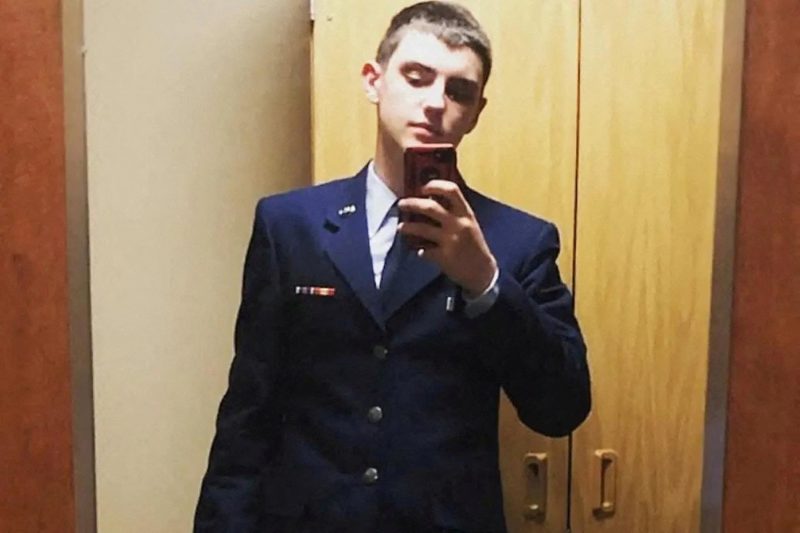Jack Teixeira, the Air National Guard member charged with leaking government secrets in an online group of gamers and gun enthusiasts, was indicted Thursday on additional charges that offer more detail about what type of classified information he allegedly mishandled.
The indictment charges Teixeira with six counts of illegal retention and transmission of national defense information, crimes which could send him to prison for years if he is convicted.
Teixeira, a 21-year-old from North Dighton, Mass., has been in jail since his April arrest. FBI agents traced to him photos posted online of classified documents. Authorities say he worked as an IT professional at a military base in Cape Cod, Mass., and abused his top secret clearance by illegally sharing U.S. intelligence assessments and other sensitive information on Discord, a social media platform popular with video game players.
Attorney General Merrick Garland said in a written statement announcing the indictment that Teixeira “was entrusted by the United States government with access to classified national defense information — including information that reasonably could be expected to cause exceptionally grave damage to national security if shared.”
The Discord Leaks
1/5
End of carousel
Teixeira is accused of violating the same section of the Espionage Act that former president Donald Trump also is charged with violating, among other crimes, for allegedly stashing classified documents at his post-presidency home in Florida. Trump has pleaded not guilty in that case.
When he was arrested, Teixeira faced two charges, but more charges were likely as the investigation progressed. Teixeira has pleaded not guilty to those two initial charges. It was not immediately clear when he would appear in court to respond to the new indictment.
The first count in Thursday’s indictment by a Boston grand jury is based on a document describing “the compromise by a foreign adversary of certain accounts belonging to a U.S. company.” It does not identify the country or the company.
The second count in the indictment alleges that Teixeira shared classified information concerning the war in Ukraine, including the provision of military equipment to the country, how it would be transferred and how it would be used. He is also charged with disclosing a document describing troop movements in Ukraine, which the indictment said was based on “sensitive U.S. intelligence, gathered through classified sources and methods.”
The descriptions of documents Teixeira allegedly shared are consistent with those obtained by The Washington Post that friends of Teixeira said he posted on Discord, with what he believed was a trusted circle of associates who would not share the information more broadly. Those friends said in recent interviews that Teixeira was motivated by a desire to keep them informed about the war in Ukraine and to reveal to them information that was not generally available to the public.
A friend who said he received the documents from Teixeira on Discord said the airman understood that the information was classified and that he was not supposed to share it with people who lacked a security clearance.
“He knew what he was doing when he posted these documents, of course. These weren’t accidental leaks of any kind,” the friend said. He added that Teixeira never intended for the information to be widely known and was not trying to expose potential wrongdoing by the government. Rather, he seemed motivated by a desire to demonstrate his superior knowledge of current events, based on his access to classified information.
“I would definitely not call him a whistleblower,” the friend said.
According to court papers filed previously by prosecutors, one of the groups where classified information was shared had upward of 150 users, and the members included “a number of individuals who represented that they resided in other countries” and whose accounts trace back to foreign internet addresses.
Prosecutors also said Teixeira was repeatedly written up by his superiors for apparently not following rules for the use of classified systems. A Sept. 15 Air Force memorandum included in the released court materials said that Teixeira “had been observed taking notes on classified intelligence information” inside a room specifically designed to handle sensitive classified material.
Teixeira, the Air Force memo said, was instructed “to no longer take notes in any form on classified intelligence information.” About a month later, a memo noted that Teixeira “was potentially ignoring the cease-and-desist order” given to him in September. He was instructed to stop “any deep dives into classified intelligence information and focus on his job,” that memo said.
Then in January, a member of his unit observed Teixeira “viewing content that was not related to his primary duty and was related to the intelligence field.” That memo also noted that Teixeira “had been previously notified to focus on his own career duties and to not seek out intelligence products.”
One of the prosecution’s filings also recounts online chats appearing to show Teixeira both bragging about his actions and understanding the potential legal consequences for doing so.
“Knowing what happens more than pretty much anyone is cool,” the airman allegedly wrote in a chat dated mid-November. When another user suggested he write a blog about the information, Teixeira replied, “making a blog would be the equivalent of what chelsea manning did,” referring to a major classified leak case in 2010.








